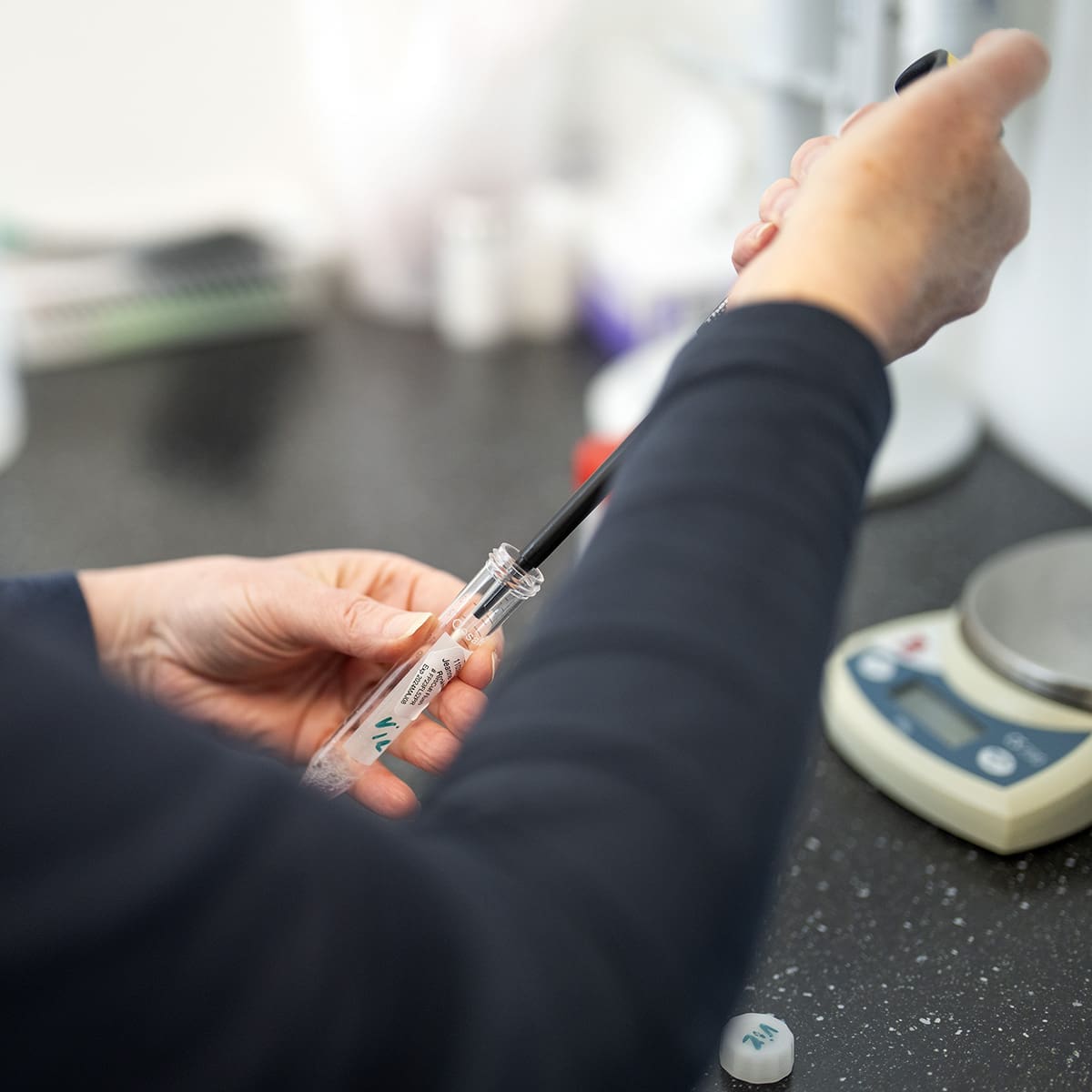
IVF treatment is the right treatment method for women/couples, when one or more of the following conditions have been detected:
- Closed or damaged fallopian tubes due to abdominal inflammation or appendicitis, a previous caesarean section or abdominal surgery.
- Reduced sperm count.
- Endometriosis (“chocolate” or “blood” cysts).
- Unexplained infertility (all testing done on the man and the woman – are normal).
- The woman or the man is sterilized.
- PCOS/hormonal disorders – that have resulted in failed hormone stimulation or insemination.
Learn more about IVF treatment and by booking a non-binding initial consultation.
Treatment methods
At the initial consultation we will plan your treatment.
Short treatment (antagonist treatment)
If we have agreed on a short treatment, the treatment generally follows the woman’s own cycle.
Hormone injections start on the 2nd day of bleeding and the daily injections continue until the first scan, which will be carried out around the 9th stimulation day. At the scan we will count the follicles and measure their size. If necessary, we will perform an additional scan after 2-3 days, but otherwise both egg retrieval and egg transfer will be planned and reviewed at this time.
The advantages of the short treatment are that it is short in terms of time and that there is no pre-treatment with hormones, so the woman avoids the side effects of these.
Long treatment (agonist therapy)
If we have agreed on a long treatment, there is plenty of time for detailed planning. You write to us on the first day of bleeding, so we can ensure that you know the process and have the hormones you need.
In the long treatment, you start down-regulation on the 21st cycle day, calculated based on your cycle length. The down-regulation can be a nasal spray, which can be taken 3-4 times a day, or a daily injection. Whether it should be one or the other type of down-regulation is arranged with the nurse.
If you have an irregular or short cycle, we will recommend that you begin taking birth control pills when your bleeding comes, as this allows us to calculate the right time to start down regulation.
The advantages of the long treatment are that the follicles grow more uniformly, which ideally results in more eggs, and therefore more viable eggs. It is easy to organise as the course can be planned well in advance based on your wishes. The disadvantage of the long treatment is that some women may experience side effects from down-regulation.
Registering for treatment
You can start treatment as soon as you have attended the initial consultation.
You sign up for treatment on the first day of bleeding, which is when the blood is red and flowing before noon.
Send us an email (secure or regular) and we will update your treatment plan and plan up until the first scan.
We answer emails regularly and if you write on the weekend, we will reply as soon as possible and no later than Monday.

What is IVF treatment?
IVF treatment (In Vitro Fertilisation) is when eggs are retrieved from the woman’s ovaries and fertilised with sperm in the laboratory. After 2-5 days, one fertilised egg is placed directly into the uterus. The rest of the fertilised eggs can be frozen if they have developed into blastocysts.
The course of the treatment
Once you have registered for treatment at the start of your cycle, the days you need to come to the clinic will be planned. If you live in another country, you can be scanned in a clinic near you.
We plan your treatment on an ongoing basis and below you can read about the important days in the IVF process:
21st cycle day (start of down-regulation)
At your first appointment in the clinic, we will scan your uterus and ovaries to ensure that it is the optimal time to start down-regulation.
Your period will usually come within the first 10 days after starting down-regulation, but it may be delayed. If you have not received your period by the agreed time, please contact the clinic. We will then have to change the treatment plan slightly. This has no impact on the end result.
Day 1 of stimulation (start of hormone injections)
It is only in a few cases that it is necessary to attend the clinic on this day.
9th stimulation day (measuring the size and number of the egg follicles)
On this day, you must come to the clinic for an ultrasound scan. At the scan we are able to see how the hormone injections have worked, and we measure the size and number of your egg follicles. If they are not large enough, we will schedule another scan, usually 2-3 days later.
If possible, we will schedule the egg retrieval and egg transfer on this day.
Egg retrieval
You must arrive at the clinic at the agreed time. The egg retrieval takes place in the morning and we encourage you to eat breakfast before you come.
We recommend that you take 2 tablets of Paracetamol (500 mg) before you leave home. If you have received a sedative pill from us, you should take it 2 hours before the egg retrieval.
Your bladder must be empty on this day.
We start by applying a local anaesthetic to your vagina and placing a needle in the crook of your elbow to administer a fast-acting morphine analgesic.
We then empty the follicles one by one.
The vast majority of people find the egg retrieval procedure completely undramatic, and it is important to us that it is a good experience for you.
After the egg retrieval, you will be tired and perhaps a little sore. You can rest in a bed in one of our private rooms, until you feel well and are ready to go home.
Due to the pain medication you have received, you are NOT allowed to drive for the next 24 hours.
The day after egg retrieval you will start progesterone treatment. This can cause bloating and menstrual-like discomfort.
The sperm sample for egg retrieval
The sperm sample is usually made at home. By appointment, it can also be made in the clinic.
Sperm cups are handed out at the woman’s last scan before egg retrieval. The sperm sample must be kept warm during transport and must not be more than two hours old.
The quality of the sperm sample is best if there has been no ejaculation within the last 2-3 days. It is not an advantage to abstain from ejaculation for a longer period and therefore not more than a maximum of 5 days.
Egg transfer
After 2-5 days, a fertilised egg is placed directly into the woman’s uterus. In consultation with the doctor, the laboratory selects the best-looking egg for transfer. The rest of the eggs are grown in the laboratory until day 5 or 6 (blastocyst stage), where the eggs that are deemed to be able to lead to a pregnancy are frozen for later use.
REMEMBER to show up with a HALF-FILLED bladder for egg retrieval.
The egg transfer itself doesn’t take long and is usually not uncomfortable.
You can live your life as usual afterwards and there are no work restrictions.
However, we do not recommend strenuous physical exercise with high heat generation after the egg transfer.
We will hand you a pregnancy test to take home and instruct you to take the test on a specific date.
Pregnancy test
A pregnancy test must be taken on morning urine 12-14 days after egg transfer using the test provided.
Please write an email to us with the result. The email will be answered the next working day. Until you have heard from the clinic, you must continue the ongoing hormone therapy.
If the pregnancy test is positive, you will be given an appointment for a free pregnancy scan approximately 3-4 weeks later. The pregnancy test should always be taken even if there is bleeding, as menstrual-like bleeding can occur even during pregnancy.
If the pregnancy test is negative, hormone therapy must be stopped and you must wait for a new treatment plan.


Summer holiday 2025
The clinic is closed
for the summer holidays
from 12th – 27th of July
 Phone. +45 76 24 50 20
Phone. +45 76 24 50 20  info@ivf-syd.dk
info@ivf-syd.dk 